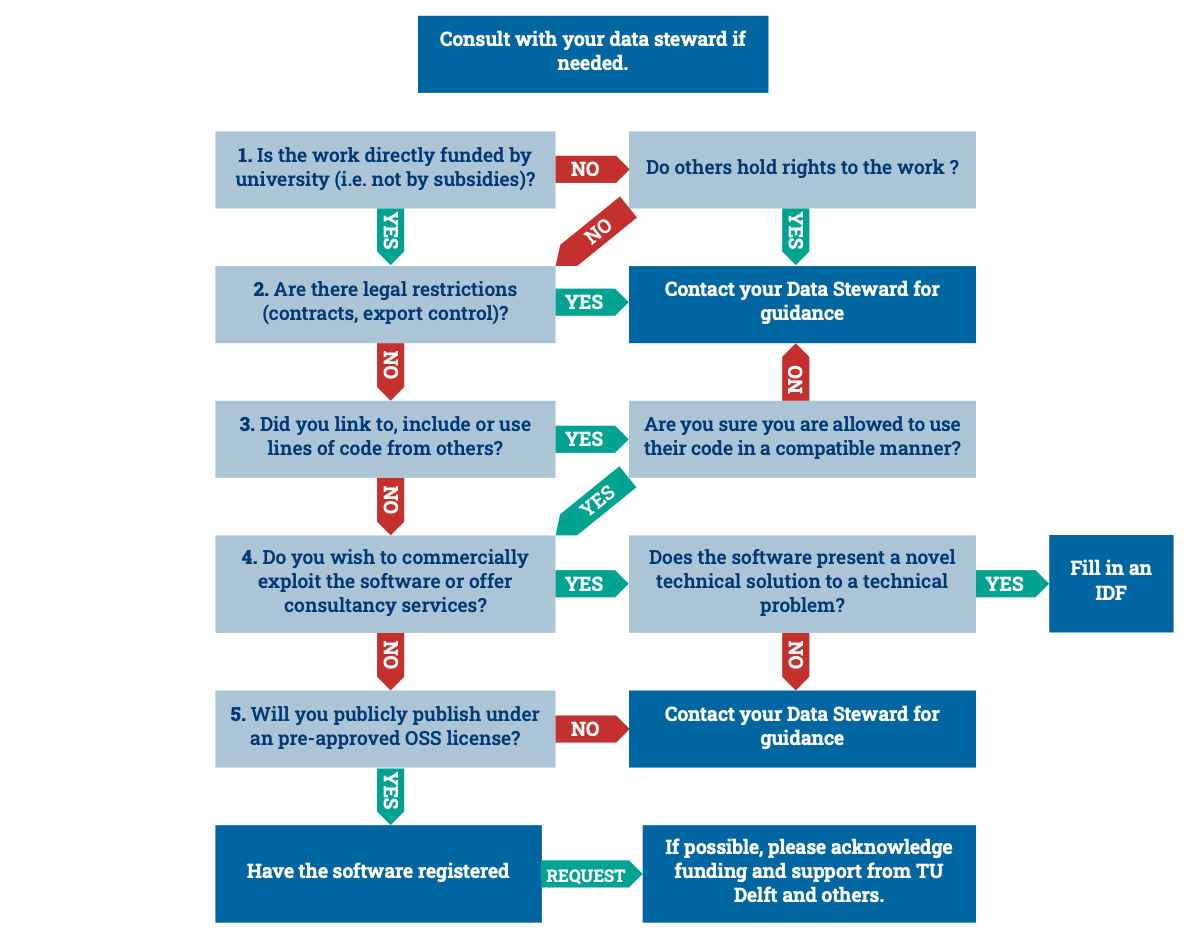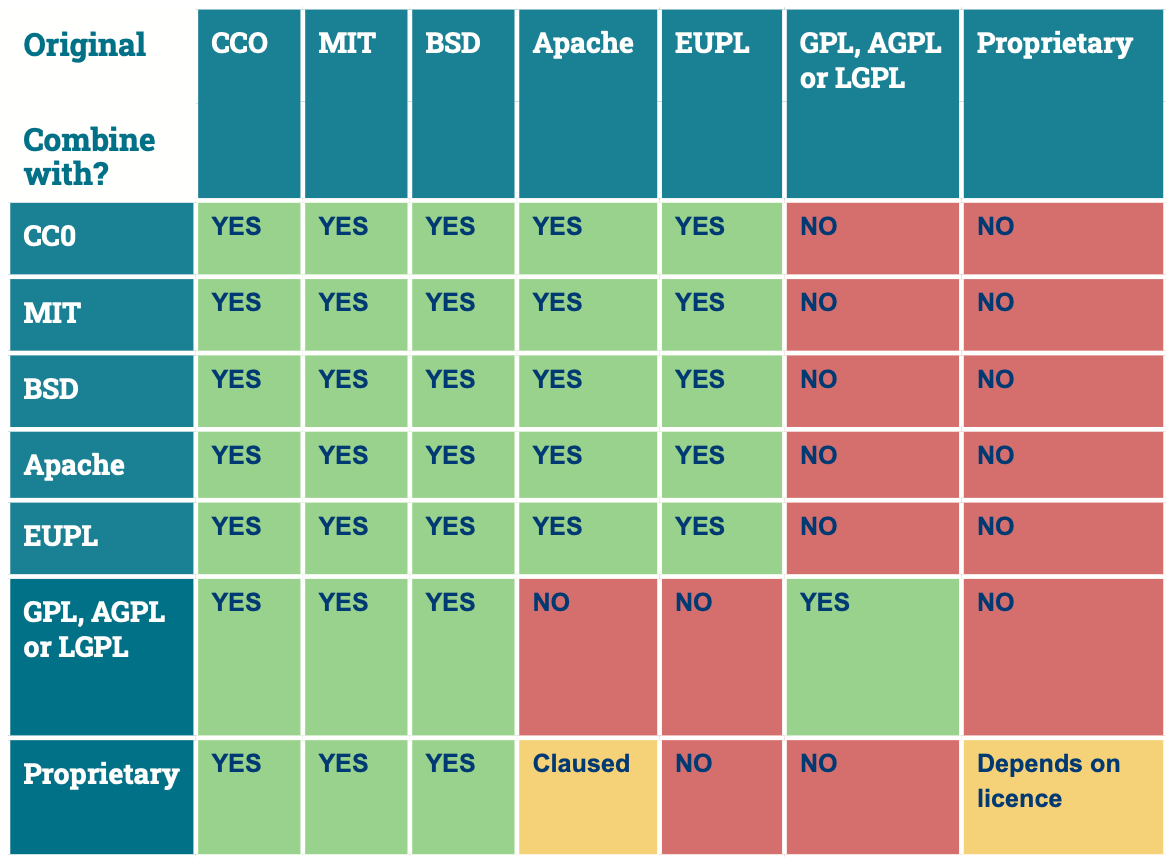Software licenses
For questions about data and software licenses, please consult your Faculty Data Steward.
TU Delft licensing policy
TU Delft, by default, holds the rights to the software created by its employees. In order to apply a pre-approved open source license, you have to follow the guidelines in TU Delft Guidelines on Research Software: Licensing, Registration and Commercialisation. It states:
Steps to apply a pre-approved open-source license
Determine if it is possible to apply an Open Source Software licence to your project (see diagram below).
The waiver of TU Delft should be added to the repository, either as a separate file or within the LICENSE file. The waiver text should be as follows:
Technische Universiteit Delft hereby disclaims all copyright interest in the program “Name program” (one line description of the content or function) written by the Author(s). [Name Dean], Dean of [Name Faculty]Assert your own, personal copyright (© YEAR, [NAME], [REFERENCE project, grant or study if desired]. Waiving the copyright and having TU Delft staff assert the copyright in their own name facilitates the use of copyleft licences.
Apply one of the TU Delft pre-approved Open Source Software licences in the format and form described in the licence text after stating, “This work is licensed under a [NAME and VERSION] OSS licence”.
Make the software openly available (for instance in an online repository such as GitHub).
Please consider acknowledging support from TU Delft and/or your funding provider.
Register the software either in 4TU.ResearchData or in PURE. Registries in 4TU.ResearchData are automatically registered in PURE.
Decision tree for applying for a license
TU Delft staff members can apply for an open-source license according to the decision tree found in TU Delft Guidelines on Research Software: Licensing, Registration and Commercialisation.
Types of open source licenses
- Permissive licenses aka copyright (e.g., MIT, BSD, Apache): These licenses allow users to do almost anything with the code, including using it in proprietary software.
- Restrictive licenses aka copyleft (e.g., GPL, AGPL, LGPL, EUPL): These licenses require any derivative works to be open source and distributed under the same license.
Copyright licenses
- MIT: Very simple and permissive, allowing almost unrestricted reuse. The software can be freely used, modified, distributed, and sublicensed.
- BSD: Similar to the MIT license, but it may include additional attribution requirements.
- Apache: Allows for the use, modification, distribution, and sublicensing of the software under certain conditions. It is often used in open-source projects and is often the choice for its balance between permissiveness and the protection of patents. The Innovation and Impact Center recommends this license for industry collaborations.
Copyleft licenses
- GPL (GNU General Public License): One of the most widespread copyleft licenses. With the GPL license, any derivative work under this license automatically becomes subject to the same GPL terms, regardless of the size of the contribution. All future modifications and adaptions of code under this license is only compatible with this license and cannot be used in proprietary software.
- Derivatives from GPL (AGPL, LGPL, EUPL): From these, the EUPL license is somewhat more flexible compared to others as it can coexist with other open-source software licenses such as MIT, BSD, and Apache. For instance, if you integrate a portion of software that is licensed under Apache into a project governed by EUPL, that portion can retain its Apache license. In contrast, under the GPL, the entire codebase would need to be licensed under GPL.
License compatibility
It is advisable to contact your faculty’s data steward regarding licensing questions. If your project involves complex legal considerations, particularly regarding intellectual property rights or compliance with licensing agreements, the Innovation and Impact Center should also be involved.
 Research Software
Research Software Data Management
Data Management Computing Infrastructure
Computing Infrastructure Catalogue
Catalogue
